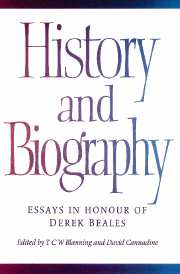Book contents
- Frontmatter
- Contents
- Notes on contributors
- Introduction: Derek Beales as historian and biographer
- 1 Baron Bartenstein on Count Haugwitz's ‘new System’ of government
- 2 The rise of the first minister in eighteenth-century Europe
- 3 An old but new biography of Leopold II
- 4 John Marsh's History of My Private Life 1752–1828
- 5 The gallows and Mr Peel
- 6 Széchenyi and Austria
- 7 Past and future in the later career of Lord John Russell
- 8 Documentary falsification and Italian biography
- 9 Kaiser Wilhelm II and the British monarchy
- 10 The historical Keynes and the history of Keynesianism
- 11 Bastianini and the weakening of the Fascist will to fight the Second World War
- 12 The New Deal without FDR: what biographies of Roosevelt cannot tell us
- History and biography: an inaugural lecture
- Derek Beales: a chronological list of publications
- Index
4 - John Marsh's History of My Private Life 1752–1828
Published online by Cambridge University Press: 10 December 2009
- Frontmatter
- Contents
- Notes on contributors
- Introduction: Derek Beales as historian and biographer
- 1 Baron Bartenstein on Count Haugwitz's ‘new System’ of government
- 2 The rise of the first minister in eighteenth-century Europe
- 3 An old but new biography of Leopold II
- 4 John Marsh's History of My Private Life 1752–1828
- 5 The gallows and Mr Peel
- 6 Széchenyi and Austria
- 7 Past and future in the later career of Lord John Russell
- 8 Documentary falsification and Italian biography
- 9 Kaiser Wilhelm II and the British monarchy
- 10 The historical Keynes and the history of Keynesianism
- 11 Bastianini and the weakening of the Fascist will to fight the Second World War
- 12 The New Deal without FDR: what biographies of Roosevelt cannot tell us
- History and biography: an inaugural lecture
- Derek Beales: a chronological list of publications
- Index
Summary
The political history of great men is useful and necessary to many; but the domestic history of all men is useful and necessary to all.
Memoirs of a Printer's Devil interspersed with local descriptions (Gainsborough, 1793)In the spring of 1796 John Marsh, a forty-four year old gentleman composer and pillar of genteel society ensconced in a fashionable Chichester townhouse, began to write a memoir of his family and ancestors. Marsh was leader of the Chichester orchestra, an enthusiastic reader of histories, scientific treatises and modern novels, a contributor to literary and musical journals and a regular performer on the organ and piano. He was eventually to compose at least twenty-eight overtures and symphonies and twelve concerti grossi, numerous services, chants, anthems and voluntaries as well as catches, glees and songs, making him one of the most prolific English composers of the eighteenth century.
But in March 1796 he was at a loose end. He had just finished composing his concerto in D, and had also completed writing his ‘Musical Definitions and Thoughts on the Different Styles of Music’, a primer for young musicians, as well as a treatise on the intermediate state of the soul, The Excursions of a Spirit. Determined to have ‘a job always at hand to employ my leisure’ (17.87), he began an account of his ancestors and the Kentish estate to which he owed his wealth. By April, and despite spending much of his spare time reading William Godwin's ‘eccentric performance’ (17.107) Caleb Williams, he had written a first draft.
- Type
- Chapter
- Information
- History and BiographyEssays in Honour of Derek Beales, pp. 72 - 87Publisher: Cambridge University PressPrint publication year: 1996
- 2
- Cited by



